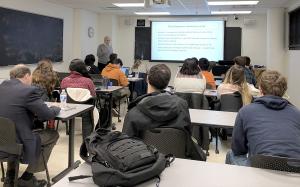
What it takes to train skilled engineers evolves, and educators must be able to see ahead and respond accordingly. With that in mind, chemical engineering launched two elective courses in spring 2020.
Fundamentals of Process Safety for Chemical Engineers
In chemical engineering, the industrial and regulatory response to serious accidents, such as the Deepwater Horizon in 2010, has been the evolution of process safety as a principal business practice. Still, many U.S. engineering programs do not offer a dedicated course, said 2019 Brenton S. Halsey Distinguished Visiting Professor in Chemical Engineering and former BP executive Ronald J. Unnerstall.
“As an employer, it’s highly desirable to have a process safety-trained chemical engineer who has gone through the thought process and methodology,” he said.
Unnerstall developed the elective, which prepares undergraduate and graduate students to recognize process safety hazards, evaluate the risks associated with the hazards, and understand how to mitigate, control and manage those risks through design, operation and use of management systems.
Creation of the course was enabled by a donation from F. Gregory Hudson. Hudson is a retired nuclear design engineer who earned B.S. and M.E. degrees in nuclear engineering from UVA.
Hudson teamed with Unnerstall after the two were introduced and realized they were of the same mind. Hudson was looking for ways to give back to UVA Engineering, and he was especially interested in safety systems from his experience in the nuclear industry. Unnerstall, for whom process safety became a priority during his time at BP, was keen to expand the department’s course offerings and overall safety programs.
Data Science and Machine Learning for Chemical Engineers
For years, extracting useful insights from the amount of data available today has been a struggle in business, industry and academia. The interdisciplinary field of data science is responding with new mathematical tools.
As computational methods expand, so does the need to teach engineers how to apply them. Assistant professor Chris Paolucci’s course is a practical introduction to data analysis for chemical engineers.
It covers data storage and retrieval in addition to mathematical techniques and programming skills used in data science and machine learning, such as how to select and validate computer models for use in predicting laboratory outcomes under defined conditions. Students apply the skills through case studies.